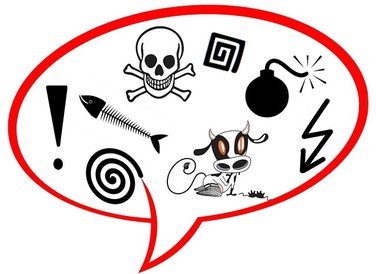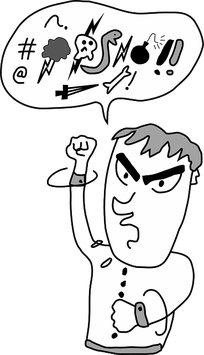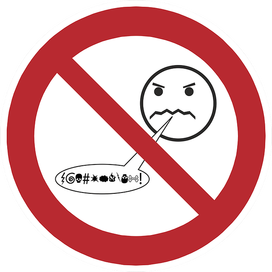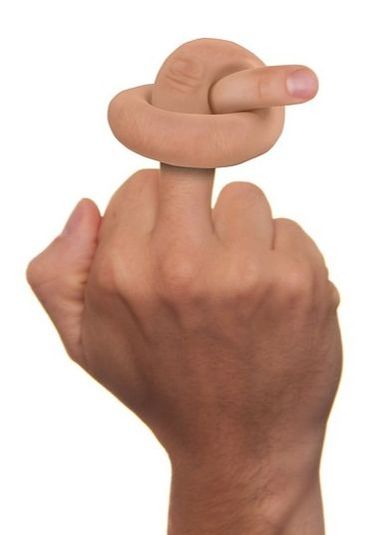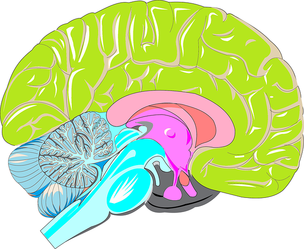OK, I understand that swearing actually makes you stronger when you're pushing yourself to the limits such as at the end of a workout or opening that darn pickle jar. A study has actually proven that swearing gives you a boost in strength. The same effect is not seen with "neutral" words. A previous study proved that when we're in pain, swearing helps us to tolerate it. Think labor and delivery.
Why? What's the process for this "turbo-boost" of strength and pain tolerance? Apparently, swearing triggers the sympathetic nervous system which releases adrenaline. Adrenaline is the hormone released by the adrenal glands during times of stress or perception of threat. When you're excited or afraid, your blood circulates faster, your breathing increases and the carbohydrates in your guts are metabolized faster and this process prepares your muscles to stay and fight or flee. You've heard the phrase "adrenaline rush" and "adrenaline junkie". This is it!
My friend moved here from England. Seriously, I'd fall out laughing when he would swear. It just didn't have any power whatsoever. He and I stood in front of a mirror and practiced "American swearing". He got really good at it!
We tend to reserve judgment about people who swear under circumstances of stress, shock/surprise, pain or exertion. If there's a reason for it, we'll give you a break.
I was in a party supply store several weeks ago. I heard a man screaming swear words in the aisle next to me. Finally, curiosity got the better of me and I turned the corner to see him, still swearing at the top of his lungs, while his soon-to-be 6 year old was standing next to him, looking as though he was in a daze. The man was there buying supplies for his son's 6th birthday the following week. I know because he was screaming at the kid's mom on the phone from time-to-time.
The entire time he made his way through the store, he was swearing about everything. He didn't seem angry by the time he reached the checkout, but he was still swearing.
When he began making lewd and rude comments to a group of young women who were purchasing supplies for a surprise party, I took a step toward him and said, "Enough!" loudly. At that point, he admonished me for scaring his son. I smiled. He grabbed his bags and huffed out the door. I received applause.
Whereas I had no right to tell him how to parent his child, when his conduct spread to other "victims", I was having none of that.
So, there's that kind of situation. Now, let's talk about you and me as parents and where we stand on swearing in front of the kids or other family. This is a tough one.
I grew up with Rodney Dangerfield, Jerry Lewis, Bob Hope, Steve Martin, Billy Crystal, Tim Conway, Johnny Carson, Bob Newhart, Harvey Korman, Carol Burnett, Lucille Ball and so many others who relied on their observations of the world, physical comedy, timing, facial expressions, accents and situations to just make us fall out laughing. Comedy today can be this quality or it can be the "other stuff". I enjoy most of it.
My parents had no problems letting us watch the shows although Mom and Dad thought that Saturday Night Live was a bit "edgy". They let us watch it because, frankly, the show was unparalleled.
I reference Carlin and Williams because I don't believe that expression, "If you can't be interesting without profanity, then let's face it' you're not that interesting". I disagree. I'm not sure which definition of profanity they're using, but some of our greatest leaders have used "salty" language to convey a message, so the "language" depends on the words, the audience, the speaker and the context.
You can't get away from it. Don't make a habit of swearing in front of your kids. You can't justify it.
I know that profanity is the native language of adolescents and every middle and high school teacher knows it. At that age, teachers don't automatically think it's coming from you.
Let me say that I was "shocked and shaken" when I heard my middle school son talking with his friends on the phone. As it turns out, the "F" word is a noun, a pronoun, a verb, an adjective, an adverb, a preposition, a conjunction and an interjection. Take your pick. He was using it in every form. He got off the phone and looked at me with that, "Oh no!" expression and I said, "Tell me about this" and he said, "I talk like this at school. Everybody does". I left it alone. I knew he was right. That wasn't a hill I was prepared to die on. He knew the family culture was not consistent with that kind of language, but he was adapting.
The study revealed several interesting dynamics. While the researchers were looking for an association between cursing and lying, they learned the following quite by accident:
- When you lie, you don't refer to yourself as much as when you're telling the truth. Can it be you don't want to be associated with lying?
- You use someone's name instead of pronouns. Trying to improve your credibility?
- You express more negative feelings because of the discomfort that lying causes. Oh my, your distress is oozing out of you!
- Because lying requires more mental resources in order to cover it up, you use simpler language, usually more "motion verbs". Are you trying to make your lies entertaining?
Now, let's talk about hypocrisy. Aren't swear words arbitrary? We say sh*t when we slam our finger in the drawer, but talk about "poo in the potty". It's about our emotional state, our audience and the context of the situation that qualifies the language as being unacceptable. You have to make a decision in that nano-second if you want to deal with the fallout of that word.
And, let's look at history. Words that are used frequently often lose their power. What's "naughty" today, will be "the usual" tomorrow. I read an article about historical equivalences of our current profanities. For example, swive, in Shakespeare's era, was equivalent to our "F" word, but has no meaning for us today. Give us 300 years and "F*ck that!" will leave everyone saying, "What?" Dick previously referred to a riding crop, but not anymore.
Public Service Announcement: Let's not swear at the kids, shall we? There's a difference between swearing at the situation and humiliating and demeaning the kids. To have that decent human being you were hoping to see at the age of 18, you can't use profanity to rip your kid apart.
And remember, those with ADHD struggle with verbal gate-keeping. They may not consider their words before they fall out of their mouths. They may also struggle with finding the words they want to say and substitute profanity instead. Use these incidences as "teachable moments" to educate them on how the ADHD gets them into trouble. Sit them down and give them a chance to say what they need to say. Practice will help them to wire their brains to slow down when they're upset and chose the words.
In my family, I was frequently heard saying, "That kind of talk will get you divorced or fired. Take your pick".
- Avoid swearing on a regular basis. But, when you do, announce that you've made a mistake and you're practicing not swearing and you'll need help with that. Thank your kids for understanding that you make mistakes. Oh baby, there's some mileage there. You're not grown up. You never will be, hopefully, and mistakes are part of the territory. When they make mistakes, you return the favor.
- If you don't get emotional about words, the kids won't say to themselves, "Oh, that's a good one. I'm using that the next time". Remember, it's about emotional power, so keep yours.
- If they insist on using words that are unacceptable to your family's culture, sit them down. Ask them what kind of person they want to be. Don't over-talk. Ask them if they want to be respected and thought of in positive ways. That's it.
- Tell them "what" will happen the next time. Quickly and consistently implement the consequences without emotionality. Make sure you communicate that this is "not what the Smith family does". Put their behavior in the context of the "family herd". It lessens the sting and you're basically speaking for the family which has more power than just one parent.
- Let them know they're a "person under construction" and that they make mistakes and improvement is the goal.
- Keep working at it until it's done.
- Find a "replacement" word. In our family, it was "succotash". Sounded naughty enough...
People with damage in this area struggle with expressing their thoughts, but they can swear if surprised, in pain or angry. As it turns out, that "spontaneous language pathway" is completely different from the "intentional speech" pathway. The "spontaneous pathway" is ancient and predates our ability to "speak our mind". We could swear and express surprise before we had the language skills to share our ideas, knowledge and opinions.
Join me on Facebook at Dr. Claudia McCulloch

